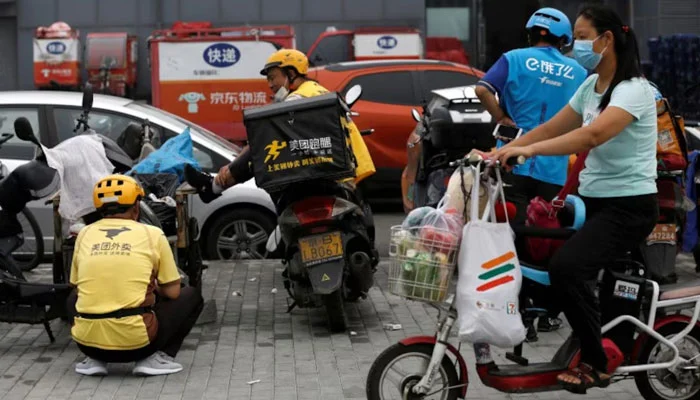China’s largest online shopping companies, Alibaba and JD.com, are now competing to deliver orders faster than ever before. This year, both have launched instant retail services, aiming to get goods to customers in a mere 30 to 60 minutes, investing heavily and moving swiftly to win this new battle for speed.
Investors will be closely examining this strategy when JD.com releases its quarterly earnings on Tuesday and Alibaba on Thursday, as finding new avenues for growth has presented a significant challenge for China’s leading online retailers. Their market penetration is already extensive, and goods prices are under pressure due to a slowdown in consumer spending driven by concerns about employment and wages, as well as a prolonged downturn in the property market.
This new battleground focused on speed comes at a substantial short-term cost, as the e-commerce giants seek to attract consumers with significant discounts. JD.com’s JD Takeaway and Alibaba’s food delivery app, Ele.me, both pledged 10 billion yuan ($1.38 billion) in subsidies last month. JD Takeaway stated its investment would be over a year, while Ele.me did not specify a timeframe.
“The competition is so intense, there’s not a lot of incremental growth opportunities, so everybody is moving into everybody else’s territories and instant retail is the latest example of that,” commented Jason Yu, general manager at CTR Market Research.
China’s dominant food delivery platform, Meituan, has expanded its business by growing its instashopping platform, which delivers non-food items within 30 minutes. JD.com also announced its entry into the food delivery market in February.
“In the past people would go to JD.com to buy a mobile phone and they would deliver to you in the same day, then suddenly they could go to Meituan and have the new Apple iPhone delivered within 30 minutes. That posed a direct threat to JD.com and they moved into food delivery in response,” Yu explained.
At the end of April, Alibaba broadened its instant shopping portal on its domestic e-commerce app, Taobao. This provided users with access to restaurants, coffee shops, and bubble tea chains available on Alibaba’s Ele.me – China’s second-largest food delivery player after Meituan – along with numerous other categories including pet food and apparel.
Alibaba, JD.com, and Meituan did not respond to requests for comment on these developments.
Subsidized spending on instant retail by Alibaba and JD.com is being welcomed by price-sensitive consumers. Users on JD Takeaway currently enjoy discounts of up to 20 yuan, or $2.77, per day on deliveries from restaurants like McDonald’s, Haidilao, and Burger King. On Taobao’s instant shopping portal, consumers can receive an 11 yuan discount on purchases of at least 15 yuan.
Liu Qi, 24, a small business owner in Tianjin, expressed his satisfaction after recently purchasing a coconut latte on JD Takeaway for just 5.9 yuan. “I asked the deliveryman and he said he makes 4 yuan per delivery, so essentially, JD.com bought me a cup of coffee and delivered it to my door,” Liu said. He was even more surprised days later when he bought a coffee on Taobao’s instant shopping portal for only 3.9 yuan. “It was 2 yuan cheaper than JD.com!” he exclaimed.
War Chests
While subsidizing consumer discounts for instant retail is costly, China’s e-commerce giants possess substantial cash reserves. As of December 31, Alibaba, JD.com, and Meituan had net cash positions of 400 billion, 144 billion, and 110 billion yuan respectively, according to analysts at Morningstar.
Despite the inherently low margins in this business, a renewed focus on instant retail made strategic sense for both JD.com and Alibaba, partly because both companies already have extensive networks of couriers at their disposal, analysts noted. This eliminates the need for an expensive build-out of delivery infrastructure that would be necessary for potential new entrants like PDD Holdings, the owner of Temu.
Beijing-based independent industry analyst Liu Xingliang suggested that Alibaba and JD.com are leveraging the high-frequency demand for food, coffee, and bubble tea to stimulate lower-frequency demand for clothing, electronics, and other higher-margin purchases – betting that increased app usage might lead to overall higher spending.
For JD.com, the expansion into instant retail was particularly crucial given that its traditional e-commerce business appeared to have reached a saturation point, he stated. “It must try to gain market share in new business areas.”



